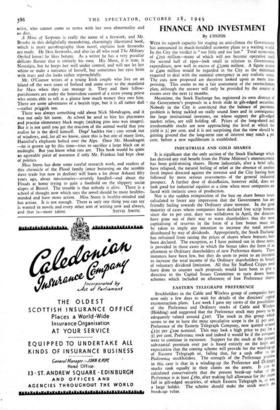FINANCE AND INVESTMENT
By CUSTOS
WITH its superb capacity for staging an anti-climax the Government has announced its much-heralded economy plans to a waiting world. In the City the verdict is " too little and too late." Total economies of £250 million—many of which will not become operative until the second half of 1950—look small in relation to Government expenditure, now well in excess of £3,000 million. A figure nearer to L.soo million would be regarded in the City as the minimum required to deal with the national emergency in any realistic sense. The cuts now proposed are therefore looked upon as mere tem- porising. This seems to me a fair assessment of the retrenchment plan, although the answer will only be provided by the course of events over the next 12 months.
Meantime, the Stock Exchange has registered its own distrust of • the Government's proposals in a fresh slide in gilt-edged securities. Nobody in the City is convinced that the balance of paymenn problem is being tackled on really sound lines and in consequence the large institutional investors, on whose support the gilt-edged market relies, are still holding off. Prices of the long-dated and irredeemable stocks are now approaching the level at which the yield is 31 per cent. and it is not surprising that the view should be gaining ground that the long-term rate of interest may reach 4 per cent. before a new equilibrium is established.
INDUSTRIALS AND GOLD SHARES It is significant that the only section of the Stock Exchange which has derived any real benefit from the Prime Minister's announcement has been gold-mining shares. Home industrials, after a brief rally, have relapsed, the natural feeling of relief at the absence of another fresh impost directed against the investor and the City having been followed by more serious assessments. of the general industrial prospect. A further dose of disinflation, however mild, does not look good for industrial equities at a time when most companies are faced with inelastic costs of production.
Nor is the sudden reimposition of the ban on share bonus issues calculated to foster any impression that the Government has any friendly feeling towards the Ordinary share investor. In the great majority of cases where companies have declared free scrip bonuses since the so per cent. duty was withdrawn in April, the directors have gone out of their way to warn shareholders that the mere capitalising of reserves in the form of a free bonus must not be taken to imply any intention to increase the total amount distributed by way of dividends. Appropriately, the Stock Exchange has refrained from raising the prices of shares where bonuses have been declared. The exception, as I have pointed out in these notes, is provided in those cases in which the bonus takes the form of an allotment to Ordinary shareholders of new Preference shares. These instances have been few, but they do seem to point to an intention to increase the total income of the Ordinary shareholders in breach of voluntary dividend limitation. All that Sir Stafford Cripps need have done to counter such proposals would have been to give a directive to the Capital Issues Committee to turn down bonus schemes which included an allotment of free Preference shares.
EASTERN TELEGRAPH PREFERENCE
Stockholders in the Cable and Wireless group of companies have now only a few days to wait for details of the directors' capital reconstruction plans. Last week I gave my views of the possibilities of the Preference and Ordinary stocks of Cable and Wireless (Holding) and suggested that the Preference stock may prove to be adequately valued around £107. The stock in this group which seems to me to have the most speculative scope is the 31 per cent. Preference of the Eastern Telegraph Company, now quoted around £135 per Lupo nominal. This may look a high price to pay foe a 31 per cent. Preference stock and indeed it would be if the cotnpanY were to continue in existence. Support for the stock at the present substantial premium over par is based entirely on the hope and expectation that the coming scheme will provide for the wind ing-uP of Eastern Telegraph or, failing that, for a cash offer to the Preference stockholders. The strength of the Preference position in this case is that in a winding-up the Preference and OrdillifY stocks rank equally in their claims on the assets. It can be calculated conservatively that the present break-up value of the Preference is at least £160, after making full allowance for the recto fall in gilt-edged securities, of which Eastern Telegraph is, or was. a large holder. The scheme should make the stock worth the break-up valise.






































 Previous page
Previous page